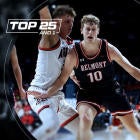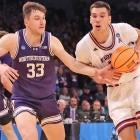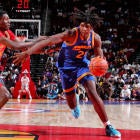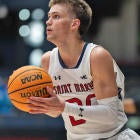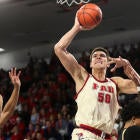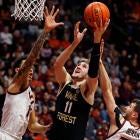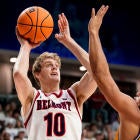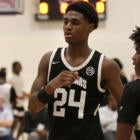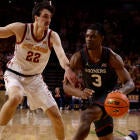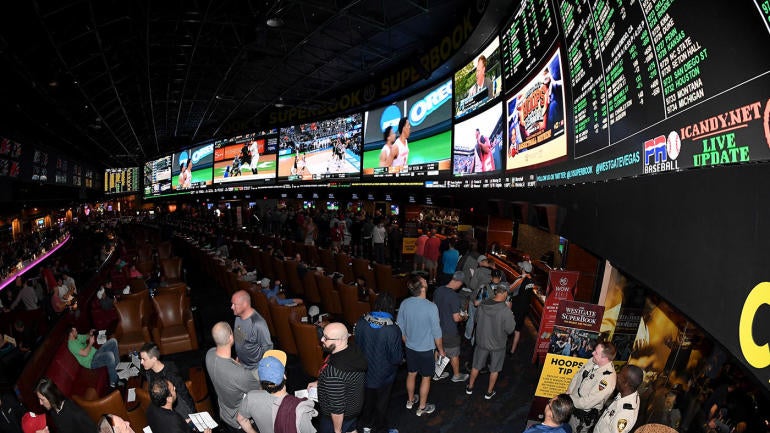
HENDERSON, Nev. -- Matt Holt pecked his keyboard, quickly calling up information to make his point. His screen lit up with wagering information regarding a late-season Monday Night Football game. Listed were approximately 3,000 prop bets. Proposition bets are micro-wagers that can be placed on everything from how long it takes a vocalist to sing "The Star-Spangled Banner" to how many 3-pointers are made in the first 5 minutes of a basketball game.
They are also the scourge of the NCAA because their existence is potentially harmful to athletes. As the association sees it, prop bets take the illegal gambling influence away from a team and center it on one player or small group of players.
"One of the easier things [illegal betting operations] can do is influence player props," Holt told CBS Sports.
As the Final Four tips off in Glendale, Arizona, this week, Holt is there at the center of it all as the president and founder of U.S. Integrity, a suburban-Las Vegas firm that specializes in sports integrity monitoring. He is also a consultant for the Power Five conferences on such matters.
Holt explained how college football prop bets could be manipulated.
"[If you want to influence] passing yards, passing touchdowns, you ... run the ball instead of throwing. Receiving yards? You just don't throw to that receiver," he said.
Sometimes, it's that simple. An unscrupulous bettor needs only one or a handful of players to make an impact in football. The history of betting scandals in college basketball is vast. A series of game-fixing scandals in the early 1950s led the NCAA to create its enforcement division.
Today, the new gambling climate across the United States scares the wits out of those in the college space. While prop bets rarely have much to do with the final score, their existence can put undue pressure on individual athletes.
Last week, NCAA president Charlie Baker urged states to ban prop bets to keep student-athletes from "getting harassed." Ohio, Vermont and Maryland were among the states that already don't allow prop bets. Louisiana followed suit this week with a ban that goes into effect Aug. 1, 2024.
With sports betting on the rise, the NCAA is acting to protect student-athletes from harassment and working to protect the integrity of the game – this week shows why it’s so important to act. pic.twitter.com/krATwpS4hZ
— NCAA News (@NCAA_PR) March 27, 2024
The NCAA confirmed to CBS Sports that police surveillance was needed last year at a national championship event because players were being targeted online. The incident was first reported by CBS News. The NCAA would not identify the extent of the issue nor the championship involved.
U.S. Integrity -- and companies like it -- became essential for conferences in 2018 when the U.S. Supreme Court decided to lift a ban on state-sponsored sports gambling.
Betting has always been a concern in the college space. There are just more, different issues with an increasingly open gaming climate.
"European gambling is 8-10 years ahead of the U.S. in terms of sophistication, in terms of what they've seen," said Dan Trolaro, vice president of prevention for Epic Global Solutions, another gambling integrity firm. "You got somebody who comes up to a kid [overseas] and says, 'You double fault in the third game of the second set, I'll make it worth your while.' They transfer here to an NCAA institution, they've already been compromised since they're young. So, now that's a concern."
Iowa and Iowa State athletes were identified last year for allegedly making improper bets from their teams' training facilities. Just last month, U.S. Integrity sent out an alert regarding "unusual wagering activity" on a UAB-Temple basketball game. The FBI and other law enforcement agencies are investigating, sources told CBS Sports.
Alabama's baseball coach was fired after it was discovered that he allegedly provided inside information for a bettor to make illegal wagers on Crimson Tide games. CBS Sports reported there was an attempt to place bets totaling six figures on an Alabama-LSU game in April 2023.
Vulnerabilities remain. Americans will wager $150 billion this year, a figure that will only grow as legalized gambling becomes more prevalent. Officials are targets because they can be put at financial risk (and it's easier to compromise referees than players or coaches).
"The easiest way to fix a game in any sport is the officials," Holt said. "In almost every sport in North America, the officials have the most impact on the sport. Think of a basketball game. It doesn't matter if he's the best player in the country, if he fouls out, he's out.
Corrupt football officials could also influence a game's point total by throwing penalty flags in key moments, impacting scoring.
"You'd be surprised how few times you'd have to break out that weapon," said a sports betting expert who asked to remain anonymous because of the specificity of the information. "Two, three, four times throughout the entirely of the game, at key moments, suddenly you completely transform a game."
In 2018, former mobster Michael Franzese detailed to CBS Sports ways in which a college football games could be fixed. He had experience doing it.
"It could be missing a field goal," Trolaro explained. "It could be throwing [an interception]. The quarterback has the ball in his hands the most. … The running back has most opportunity to fumble the ball and make it look easy. The wide receiver has the most opportunity to drop a pass."
Sports betting influence is everywhere. The Final Four comes to desert this week where, in 2021, the Arizona Diamondbacks were the first Major League Baseball franchise to allow in-person wagering. Caesars Sportsbook stands within a few steps of Chase Field.
Part of the reason the NCAA argued against state-sponsored sports gambling in front of the Supreme Court is the impact those micro-bets might have on athletes. Conferences and schools are either partnering or considering partnering with gaming companies. That seems a bit antithetical.
Last season, the NCAA adjusted its gambling rules to consider "mitigating factors" in the modern gaming climate.
Iowa athletic director Beth Goetz believes the NCAA may have gone too far in a recent case. Last summer, 14 athletes at Iowa and Iowa State were charged with gambling-related offenses. That was after state law-enforcement officials took information from a "geofence,, a virtual perimeter was erected around school athletic facilities that discovered that athletes were allegedly making improper bets from their phones.
Later, court filings seemed to indicate that the geofence was put up without a proper warrant by those state officials. Charges were dropped against four Iowa State athletes last month. One of those athletes, former Iowa State defensive end Eyioma Uwazurike, remains suspended by the NFL after being drafted by the Denver Broncos.
"Not that there shouldn't be any penalties … but societally, it's really difficult," Goetz told CBS Sports. "We're all getting bombarded [with information]. We can have a kid get into a bar fight. We can have a kid charged with a misdemeanor. There is a list of some really bad things, and they would have an opportunity to play again. You can bet $500 on something else that's not your own team, which otherwise would be legal, and your career could be over. That just doesn't align to me."
Some of the arrests at Iowa and Iowa State did involve some athletes who were under the legal gambling age of 21. NCAA rules prohibit betting on any NCAA sport regardless of age. Baker prioritized gambling awareness when he took office last year.
The NCAA is concerned about prop bets, in part, because of what it calls "targeted harassment" of athletes by bettors.
A NCAA survey from last September showed 10% of respondents were aware of an athlete being harassed in person or online. The number of Division I athletic departments that faced a gambling issue or problem tripled from 2019 to 2023.
"It's sort of a double-edged sword," Holt said. "We certainly agree, and the statistics would prove, that prop bets are more vulnerable to manipulation and harassment to the individuals than normal team bets are. That being said, the fear that always I have is by getting state regulators to ban these, are we doing ourselves a disserve by simply incentivizing people to go to the illegal market and the daily fantasy sports shops and bet on the same thing? Unfortunately, we won't have the same level of transparency … than we do the regulated sportsbooks."
Inside the U.S. Integrity offices, a dry-erase board above analysts' desks listed teams from every Power Five conference. It doesn't mean the schools listed are necessarily under suspicion. It means the analysts have detected red flags that require checking out.
"Those are our 'actives' right now," Holt pointed out. "Every one [of our analysts] has something every day. … There's so much crap out there, you have to surf through half the games."
That "crap" is detected by those analysts monitoring social media and doing keyword searches such as "suspended," "injured" and "bet."
U.S. Integrity was called by the Big Ten to hunt for betting improprieties during the Michigan sign-stealing scandal. The information allegedly gathered by Connor Stalions could have been weaponized into the equivalent of insider trading. All a bettor had to know was that Michigan had the opponents' signs that might have been enough to go heavy on the Wolverines going over the total.
Holt and his associates found no evidence of wrongdoing. Complicating matters, however, was Michigan's popularity as one of the most bet-on programs in the country.
"Even if you had inside info, if you were spreading your bets out and keeping the limits low enough, could you hide them from us? Sure," Holt said of the Michigan situation.
He added. "[The review] was done out of an abundance of caution. How [does the Big Ten] rule out the gambling aspect if they don't call in the gambling experts? On their side, they know they have an on-field competition issue. Does it extend deeper into the gambling markets?
The NCAA, integrity monitoring, conferences, everyone is trying to warn constituents about the inherent risk of gaming: the house always wins. At least eventually.
Holt referred to betting "syndicates" that exist to game the system and make pure profit using prop bets. "Arbing" is the practice by which a person or group bet all possible outcomes to ensure profit is made. Sportsbooks consider this a risk to their business for obvious reasons. Arbing means the bettor always makes money (if the bets are placed right).
"It's no different than insider trading," Holt said. "... You make money on both sides of a trade. They find them every day -- even if it's pennies. By betting one side even, the worst I can do is break even, and the other side makes me 2 cents. You're making money."
Holt continues to stress the need for across-the-board injury reports to ensure information transparency. The Big Ten last season required an injury report be posted at least two hours before football games. There were no issues with the practice, the conference told CBS Sports.
To date, no other conference has followed the Big Ten's lead.













